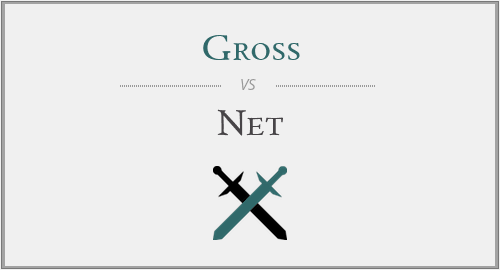Gross vs. Net: Unraveling Financial Terminology
Within the financial landscape, the terms "gross" and "net" play pivotal roles in assessing and understanding various financial aspects. This article aims to elucidate the distinctions between "gross" and "net," offering insights into their meanings, applications, and significance in financial contexts.
Definitions:
Gross:
"Gross" refers to the total amount of something before any deductions or expenses. In financial terms, it often represents the total revenue, income, or value of a particular item or entity without accounting for any deductions or losses.
Net:
"Net," on the other hand, denotes the amount remaining after all relevant deductions, expenses, or losses have been accounted for. It represents the final, actual value or income that an individual or entity receives, taking into consideration the subtracted elements.
Applications:
Gross:
The term "gross" is commonly used in various financial contexts, such as gross income, gross profit, or gross revenue. It provides a comprehensive view of the total amount before any adjustments, giving a baseline for further financial analysis.
Net:
"Net" is prevalent in financial terms like net income, net profit, or net worth. It reflects the actual, tangible value or income after accounting for expenses, taxes, and other deductions, providing a more accurate representation of financial health or profitability.

Significance:
Understanding the distinction between "gross" and "net" is essential for accurate financial assessment and decision-making. While gross figures offer a comprehensive view of total amounts, net figures provide a more realistic and actionable perspective by considering the impact of deductions and expenses.
Examples:
Company A reported a gross revenue of $1 million, but after accounting for expenses, the net profit stood at $750,000.
An individual's gross income might be $60,000 annually, but the net income, after taxes and deductions, is $45,000.
Conclusion:
In the realm of finance, "gross" and "net" serve as crucial indicators, each offering a unique perspective on financial performance. Whether assessing business profitability or personal income, understanding these terms is fundamental for informed financial decision-making.




Have a discussion about this article with the community:
Report Comment
We're doing our best to make sure our content is useful, accurate and safe.
If by any chance you spot an inappropriate comment while navigating through our website please use this form to let us know, and we'll take care of it shortly.
Attachment
You need to be logged in to favorite.
Log In